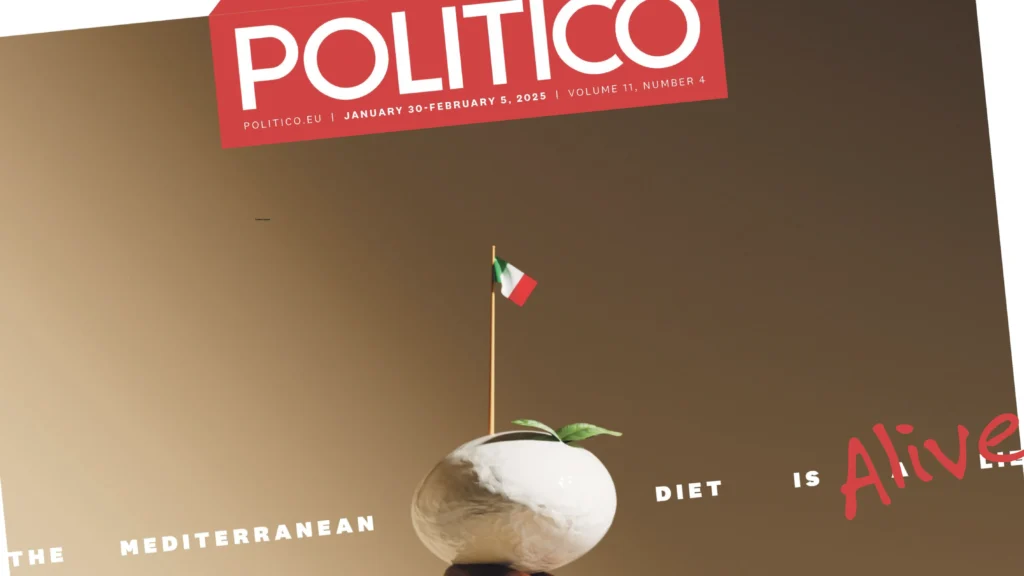More than food, a living cultural heritage and an integral ecology recipe
In a recent article appeared on Politico, “The Mediterranean Diet is a Lie”, its author Alessandro Ford presents a harsh critique of what he perceives as a politically and commercially manipulated construct. While his arguments reflect real concerns about the instrumentalization of food heritage, his conclusion — that the Mediterranean Diet (MD) is “dead” — fails to grasp its true essence.
Before an echo of the past or a marketing tool, the MD is a living cultural heritage that continues to evolve. It is not merely a set of ingredients or recipes but a dynamic system that integrates nutrition, culture, sustainability, and social well-being.
In an age of poly-crisis, dismissing the Mediterranean Diet as a myth ignores its potential as a guiding compass pointing a way out towards a more resilient future.
1. Beyond the Brand
While it is true that the Mediterranean Diet has been commodified and politicized, unfortunately, the same applies nowadays to any major cultural tradition — from sushi to yoga. The risk, to which critics are not exempted, lies in reducing it to a brand while ignoring its deep ecological and social roots.
At its core, the MD is not a fixed “diet” in the modern sense but a way of living, as per díaita, its original meaning in ancient Greek. It is not a single cuisine but a pattern shared across diverse Mediterranean communities, deeply intertwined with the rhythms of nature. Its foundation lies in a biodiverse agricultural landscape, where traditional farming methods have long prioritized seasonality, crop diversity, and organic practices.
This is no romanticized past. Even today, Italy leads Europe in organic farming, with over 64,000 certified organic producers and one of the lowest levels of pesticide residues in food. This agricultural model also translates into a significantly lower environmental impact, with Italy’s farming sector emitting 46% less CO₂ than the EU average. The connection between biodiversity and diet is tangible: the MD has thrived not through industrial monocultures but through a rich mosaic of small-scale farms, ancient grains, heirloom vegetables, and resilient ecosystems.
In this respect, UNESCO’s recognition of the Mediterranean Diet as an Intangible Cultural Heritage in 2010 was not a nostalgic operation, but an acknowledgment of this living system, which fosters biodiversity, resilient food systems, and local economies. Far from being a dead tradition, it remains a powerful model for sustainable food production and consumption.
2. The True Crisis: A Lifestyle Shift
Ford rightly points to the rise in childhood obesity in Mediterranean countries, particularly in Italy, where almost 40% of children are overweight. Yet, blaming the Mediterranean Diet for this trend is like blaming democracy for political corruption: the issue is not with the system, but with how it is practiced.
The reality is that Mediterranean societies have drifted away from an active traditional lifestyle to a more sedentary one. In fact, more children commute to school by car (67%) compared to the EU average of 50%, and Italy ranks among the highest in Europe for screen time among children. Meanwhile, despite these challenges, Italy remains the leading country in fruit and vegetable consumption and has one of the lowest intakes of sugary drinks in the EU — demonstrating that the MD is not disappearing — it is being neglected. Hence, rather than declaring it “dead,” the real challenge is to revive its principles for new generations.
This is precisely why initiatives like the Paideia Campus a Pollica, the Cilento town hosting the permanent Secretariat of the UNESCO Network of Mediterranean Diet Communities, are crucial. Through education and hands-on experiences, we offer a transformative approach to education, inspired by the paideia concept of holistic learning and modernized through the lens of Integral Ecology. Our campus serves as a Living Lab for co-creating solutions to today’s most pressing challenges, by reconnecting to the true meaning of the MD — as an integrated approach to food, nature, and community.
3. A recipe for integral ecology development
Where some see an obsolete slogan, we see a roadmap for addressing today’s polycrisis — particularly the ecological emergency.

